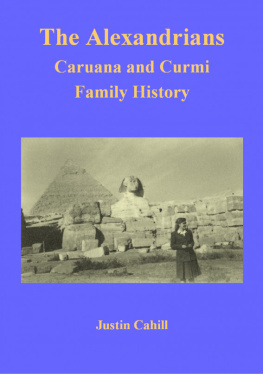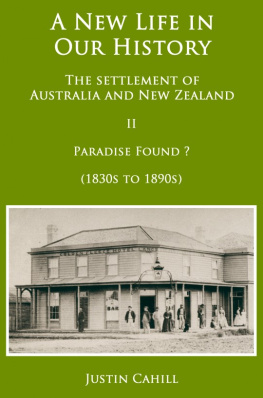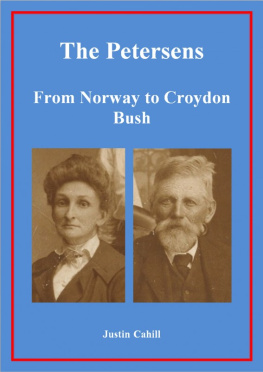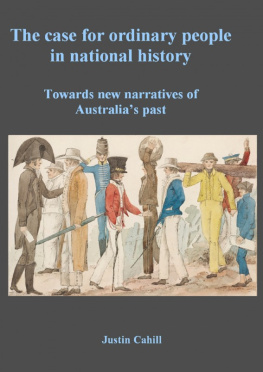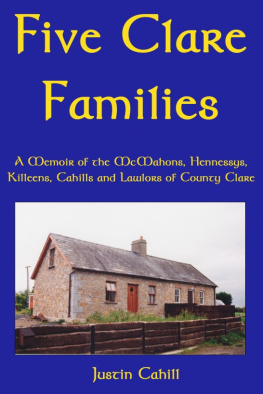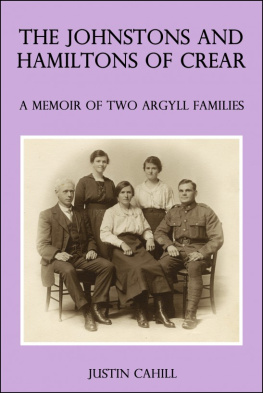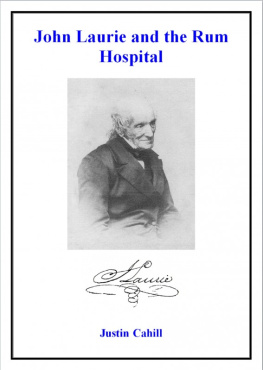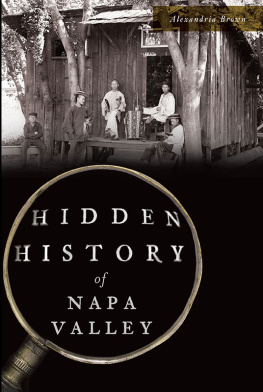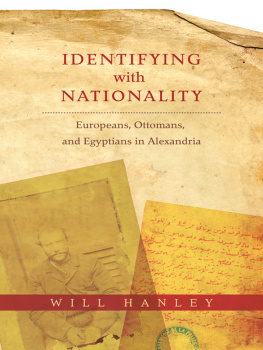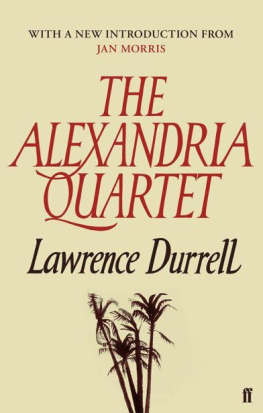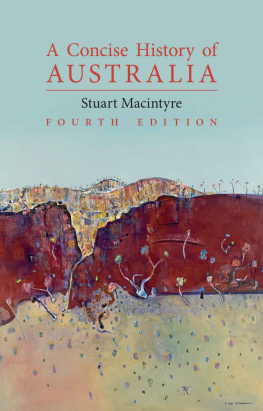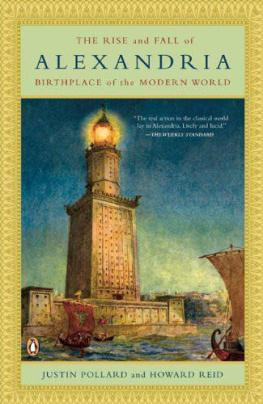Justin Cahill - The Alexandrians: Caruana and Curmi Family History
Here you can read online Justin Cahill - The Alexandrians: Caruana and Curmi Family History full text of the book (entire story) in english for free. Download pdf and epub, get meaning, cover and reviews about this ebook. year: 2016, publisher: Justin Cahill, genre: Detective and thriller. Description of the work, (preface) as well as reviews are available. Best literature library LitArk.com created for fans of good reading and offers a wide selection of genres:
Romance novel
Science fiction
Adventure
Detective
Science
History
Home and family
Prose
Art
Politics
Computer
Non-fiction
Religion
Business
Children
Humor
Choose a favorite category and find really read worthwhile books. Enjoy immersion in the world of imagination, feel the emotions of the characters or learn something new for yourself, make an fascinating discovery.
- Book:The Alexandrians: Caruana and Curmi Family History
- Author:
- Publisher:Justin Cahill
- Genre:
- Year:2016
- Rating:3 / 5
- Favourites:Add to favourites
- Your mark:
- 60
- 1
- 2
- 3
- 4
- 5
The Alexandrians: Caruana and Curmi Family History: summary, description and annotation
We offer to read an annotation, description, summary or preface (depends on what the author of the book "The Alexandrians: Caruana and Curmi Family History" wrote himself). If you haven't found the necessary information about the book — write in the comments, we will try to find it.
Alexandria. Few other cities held such a thriving, exotic mix of people and faiths. For almost a century, it was by-word for culture, glamour and luxury. The Suez Crisis shattered this idyll. In 1956 Nassar expelled the Europeans, including the Caruanas and Curmis. This account tells how they found their way to Australia and brought something of old Alexandria to a new land.
The Alexandrians: Caruana and Curmi Family History — read online for free the complete book (whole text) full work
Below is the text of the book, divided by pages. System saving the place of the last page read, allows you to conveniently read the book "The Alexandrians: Caruana and Curmi Family History" online for free, without having to search again every time where you left off. Put a bookmark, and you can go to the page where you finished reading at any time.
Font size:
Interval:
Bookmark:
Justin Cahill
Smashwords Edition
Copyright 2016 Justin Cahill
Smashwords Edition, License Notes
All rights reserved. The author asserts themoral right to be identified as
the author of this work. Thisebook may not be reproduced by any means in
any form without thecop yright holders writtenconsent
All inquiries to Justin Cahill at
PO Box 108, Lindfield, 2070
New South Wales, Australia
or email to
For Jeanne, Norbert and Roger
My first answerto thequestion What is history ? is that it isan unending
dialogue between the presentand the past .
- Edward Carr,Wh at is History ? ,Penguin Books Ltd, Harmondsworth, 1964, p.30.
Cover: Jeanne Curmi (formerly Caruana), theSphinx and the Great Pyramid at Giza, taken about 1951.
I
My father-in-law Norbert, or to give hisfull name, Norbert Spiro Jacomo Anthony Caruana, is fromAlexandria. Jeanne Adle Curmi, his elder sister, and he were bornthere during the late 1920s and early 1930s.
Before the Nationalist Revolution in 1952Alexandria was a thriving, cosmopolitan metropolis. Communities ofGreeks, Italians, French, Maltese, Armenians, Jews, Russians andothers lived among the local Egyptians. Most people spoke severallanguages. It was a colourful, intoxicating mix of faiths andcultures, all under the nominal rule of the ill-fated King Farouk.He was like a little boy Jeanne recalled. He lovedtrains. No-one liked Farouk - even the locals Norbertdeclared But you couldnt say anything against him, or theSecurity Police would pounce on you !
The city and the nation were distinct. Itspeople describe themselves as Alexandarians, not Egyptians. Theyhad their own ethos. It was taboo to talk about religion ornationality Jeanne explained. Thats how things were. Butwe helped each other out. If you could help, you helped.
The way of life, Alexandriashabitude, was languid and vaguely corrupt. Many of thelocals were poor or badly paid, so giving baksheesh to get thingsdone was part of how things were. It was never done overly ofcourse Norbert recalled that would give offence. If youwanted someone to do something, you would put some money in apacket of cigarettes and say Look, have a cigarette.Theyd go to take one and youd say No look, take thepacket - I have another one somewhere.
There was a conspicuous gap between thecolonists and local Egyptians. Manoly Lascaris, who was living inAlexandria when he and the novelist Patrick White became lovers,recalled: The parties were incredible. Those who really wererich had immense houses[with] vast entertaining rooms. Parties ofup to a thousand: mountains of caviar and champagneThe women worethe most fabulous clothes. The women were all dressed inParisJewellery. Incredible jewelley Servants were cheap.Foreigners paid no income tax one felt sorry for theEgyptiansone was conscious of being a parasiteThe country afterall belonged to them.
The City inspired many writers. EM Forsterwrote a short history and travel guide, published in 1922. But itwas Lawrence Durrell who provided the most well-known account ofthis lost world in his Alexandria Quartet. Once I was toldthat Jeanne and Norbert loved Durrells novels as they evoked theAlexandria they knew. I asked Norbert about this. No! hedeclared firmly It was really a fantasy, a product of hisimagination. He depicted some characters he picked up while livingthere. He got some things right, like the Carnival before AshWednesday and the big parties in town. But that was it.
II
Norbert loves to cook. His range of dishesreflects his Alexandrian origins. Much of his day-to-day cuisine isItalian. Every Thursday night at the Caruana house is pastanight, which is occasionally extended to every Sunday too. OtherItalian-influenced meals include veal parmigiana, chickencacciatore, ravioli, gnocchi, cannelloni, pizza and saltimbocca.Occasionally he prepares more elaborate dishes, such as bragoli,veal with porcini mushrooms or osso bucco.
Special banquets for when the extendedfamily visit start with Jeannes cheese pie or her spinach pie,which are Greek. Sometimes there is antipasto of prosciutto,mortadella, olives, dolmades, salami, artichokes and dried figs.Occasionally, there is also pastizzi, a Maltese pastry.
For entre, there is melokhia soup, anEgyptian dish. Main meals might consist of French dishes, such ascoq au vin, cassoulet, beef stew with wine, whole white fish bakedon a bed of potatoes and onions or beef with barnaise sauce.Sometimes, Norbert also makes baked macaroni, a Maltese dish, ormoussaka, which is Greek. Other Middle Eastern dishes include Koftaand falafel, which Norbert insists must be made in the Egyptian wayfrom beans (ful) and not with chickpeas, which the Lebanese use.Jeanne makes kibbi, another Middle Eastern dish (and one of herhusband, Rogers, favourites). They also have a type of potatosalad made with beetroot and eggs, called a Russian salad. Dessertsis usually crpe suzette or a large plate of Lebanese cakes broughtby Jeanne and Roger.
When we eat, we remember. After a good mealand a few glass of wine, Norbert often sits back and reminiscesabout the old days in Alexandria. An eloquent raconteur with a keeneye for humorous, often scandalous, incidents Norbert has a largefund of stories. When I was on leave, we often had lunch together.Gradually I realized his stories were of a lost world - an exoticplace that existed in more tolerant times, but now survives only inthe memories of those who lived there. I started to write hisanecdotes down on odd scraps of paper or in my notebooks. In 2008,I typed up these stories and gave copies to Norbert and Jeanne.After lunch or dinner, I sat down with Norbert to correct what Ihad written. Then I checked with Jeanne, also a great raconteurwho, like Norbert, recounts whole conversations from decades ago asif they happened yesterday.
III
Naturally, people always have differentviews about what happened. So it was with Jeanne and Norbert.Jeanne is five years older than Norbert, although Norbert says hecan remember things from the age of two. Also Norbert leftAlexandria in 1951, while Jeanne stayed there until 1956. So Jeanneobviously has different memories from Norbert. Sometimes, they didnot agree on what happened or who did what. As these things are notfor me to judge, where they give different versions of events Ihave included them both. Then there is Roger, Jeannes husband. Now90, he is the eldest of the three Alexandrians. He has his ownstories, which I now include here too. After all, he once warned mewere a dying breed.
Where I have been able to check theirrecollections against published works, I have done so. But thisremains mostly an oral history, as were the first survivinghistories by Herodotus and Thucydides. While memories are fallible,they are often a more evocative source than documents. A scent, forexample, can trigger a stream of memories that evoke a sense ofplace. There were men who made bread at the corner of thestreet we lived on, Sidi Gaber Avenue Jeanne recalled. Iwould come home from work hungry, smell the freshly made bread andget some.
Also, people will have their own viewsregardless what they read in other books. Jeanne recalls bringinghome her new school books to show her mother, Helen, who waspart-Austrian. They included Le Petite Poucet (the LittleThumb) a French fairytale, the Bible and a history of France.Helen looked through the history and saw that it claimed the Frenchhad won a certain battle. No Austria won that battle!Helen exclaimed.
The people mentioned in this book came fromdiverse national and linguistic backgrounds. They range fromFrance, Malta and Lebanon to Slovenia. Their languages includedFrench, Slovenian, a northern Italian dialect and Arabic. As I onlyspeak English, I have given their names in English, followed by anyvariations in other languages in parentheses. Jeanne and Rogerseldest son, Paul, kindly read my drafts and provided his ownmemories. So did Norberts daughter, Katherine Caruana, my wife andBob Abela, a relative of Norbert and Jeannes
Font size:
Interval:
Bookmark:
Similar books «The Alexandrians: Caruana and Curmi Family History»
Look at similar books to The Alexandrians: Caruana and Curmi Family History. We have selected literature similar in name and meaning in the hope of providing readers with more options to find new, interesting, not yet read works.
Discussion, reviews of the book The Alexandrians: Caruana and Curmi Family History and just readers' own opinions. Leave your comments, write what you think about the work, its meaning or the main characters. Specify what exactly you liked and what you didn't like, and why you think so.

